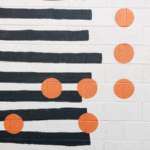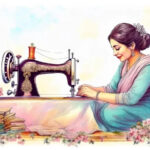My bookshelves are stacked with journals, children’s books, histories, dictionaries, novels, travel guides, philosophy and the thousands of books I read in my youth and continue reading today. I pull out Bertrand Russell’s A History of Western Philosophy. I was 20 when I read that book. It was one of the defining books of my life, challenging me with Plato, Jewish and Islamic philosophy, Nietzsche, the great philosophers and that eternal question, ‘What is truth?’
I am always seeking truth in my work, challenging young and adult readers to think about what they want to be. When I wrote ‘War is not brave, but men can be brave in war and in life’, in my young adult novel The Cave, it was one of those cathartic moments that was so sweet in its discovery. It felt like a Bertrand Russell moment, where I tripped into a profound personal truth. I offered my revelation to readers to interpret and make it their own. It was like uncovering ‘good’ and ‘evil’ with their blurred boundaries.
Rousseau’s romantic enlightenment and the ‘noble savage’ also profoundly impacted my thoughts and writing. I read Emile – on Education at eighteen. Is man born good? However, I also read William Shirer’s The Rise and Fall of the Third Reich, exposing man’s capacity for evil. Searching for ‘good’, facing ‘evil’ is integral to my writing even when it is light-of-touch, clothed in humour and slice-of-life days as I search to understand identity, father-daughter relationships, divorce, bullying, multiculturalism, cancer, war, terrorism in Days of Thailand a short story in the deeply relevant anthology Fear Factor: Terror Incognito, feminism in my recently published book Shadows of Olive Trees and who we are.
I see my romance collection on my bookshelf – Jane Eyre by Charlotte Bronte, Wuthering Heights by Emily Bronte, all the Jane Austen novels, especially my favourite, Pride and Prejudice. My teenage years were filled with these books. I read each one ten times, seeking insights into romantic relationships as they dealt with life’s good and evil. Of course, I am in love with the heroes. In my novel Shadows of Olive Trees, Professor Davids is my Darcy; in my novel, Butterflies Katherine is my Elizabeth Bennett with a dash of Catherine Earnshaw; as the great emotions of love and passions are part of my characters.
I haven’t read poetry for a long time. I open the dusty covers of John Keats. ‘Beauty is truth, truth beauty,—that is all Ye know on earth, and all ye need to know.’ (From Ode to a Grecian Urn). These beautiful lines are part of me, as I write.
As an avaricious reader, the great writers of the past, strongly influence my work. These writers have all settled inside my imagination, mind, ethos, but who do I choose for the most significant influence?
In Xanadu did Kubla Khan
A stately pleasure-dome decree:
Where Alph, the sacred river ran
Through caverns measureless to man,
Down to a sunless sea.
It has to be Coleridge, especially ‘Kubla Khan’. Kubla Khan’s journey inside a journey is embedded with personal, philosophical, cultural, passionate flavours, images, sensuality, good and evil, worlds within worlds – ‘caverns’, ‘sunless seas’, ‘sinuous rills’, romantic chasm’, ‘turmoil seething’. It draws you into imagination, pleasure, raw sexuality, sensuality, threats of war, but there’s the ‘pleasure-dome with caves of ice!’ Of course, I carefully slip in Coleridge in the passionate romance of love and literature and Professor Davids in Shadows of Olive Trees.
My story Remembering Timor Leste is in the powerful anthology Alien Shores: Tales of Refugees and Asylum Seekers from Australia and the Indian Subcontinent challenging fear, prejudice and calling for action.
An extract:-
I’m too old to be scared at night. I’m thirteen. Florentia is eight. She’s not scared. It’s because she doesn’t remember East Timor. Memories cut into my head. Screamings, beatings, men in uniforms, guns, machetes. Frangipanis burning. There were no shrines left, just crocodiles carved in wood with snarling teeth. I watched with one eye from behind my Mama’s sarong. Uniformed men dragged my big sister away. Pa ran and ran after them but he didn’t bring her back. I have to be very, very good to make it up to my Mama and Pa. I look after Florentia. I will never let anyone hurt her and I will write letters to the nuns until we find my sister. (Extract from Alien Shores)
Reading literature is enriching, and is part of the lifelong journey of a writer.
References:-
Meenakshi Bharat and Sharon Rundle, (eds) Fear Factor: Terror Incognito, Picador Pan MacMillan Australia 2010. Foreward: Yasmine Gooneratne ISBN 978 0 330 42621 3
Meenakshi Bharat and Sharon Rundle (eds) Alien Shores Brass Monkey Books Australia 2012. Foreward: Rosie Scott ISBN 978 0 980 86393 2
Susanne Gervay, Shadows of Olive Trees, Flying Elephant Media, Australia 2019 ISBN 978 06 4820 354 4
Susanne Gervay – www.sgervay.com



